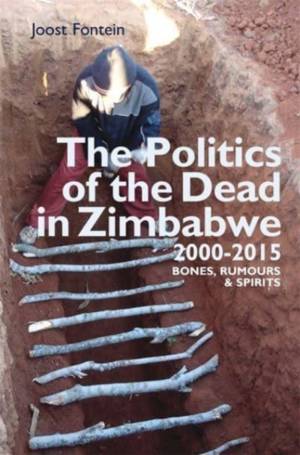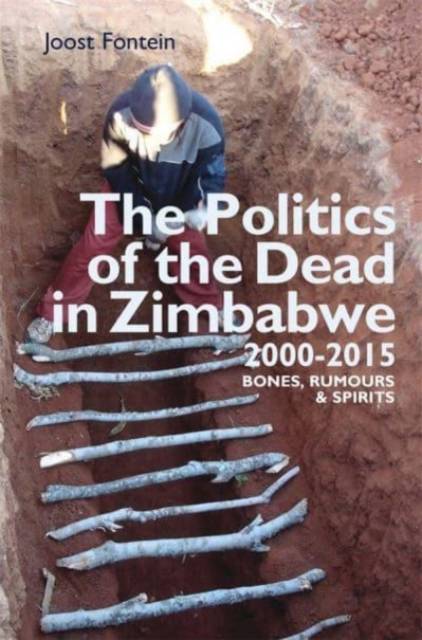
- Afhalen na 1 uur in een winkel met voorraad
- Gratis thuislevering in België vanaf € 30
- Ruim aanbod met 7 miljoen producten
- Afhalen na 1 uur in een winkel met voorraad
- Gratis thuislevering in België vanaf € 30
- Ruim aanbod met 7 miljoen producten
Zoeken
The Politics of the Dead in Zimbabwe 2000-2020
Bones, Rumours & Spirits
Joost Fontein
Hardcover | Engels
€ 209,45
+ 418 punten
Uitvoering
Omschrijving
Innovative and challenging study that provides fresh insights on the anthropology of death and postcolonial politics.
In 1898, just before she was hanged for rebelling against colonial rule, Charwe Nyakasikana, spirit medium of the legendary ancestor Ambuya Nehanda, famously prophesised that "my bones will rise again". A century later bones, bodies and human remains have come to occupy an increasingly complex place in Zimbabwe's postcolonial milieu. From ancestral "bones" rising again in the struggle for independence, and later land, to resurfacing bones of unsettled wardead; and from the troubling decaying remains of post-independence gukurahundi massacres to the leaky, tortured bodies of recent election violence, human materials are intertwined in postcolonial politics in ways that go far beyond, yet necessarily implicate, contests over memory, commemoration and the representation of the past. In this book Joost Fontein examines the complexities of human remains in Zimbabwe's 'politics of the dead'. Challenging and innovative, he takes us beyond current scholarship on memory, commemoration and the changing significance of 'traditional' death practices, to examine the political implications of human remains as material substances, as duplicitous rumours, and as returning spirits. Linking the indeterminacy of human substances to the productive but precarious uncertainties of rumours and spirits, the book points to how the incompleteness of death is politically productive and ultimately derives from the problematic, entangled excessivities of human material and immaterial existence, and is deeply intertwined with the stylistics of postcolonial power and politics. Joost Fontein is Professor of Anthropology, University of Johannesburg. He was previously Director of the British Institute in Eastern Africa and Lecturer in Social Anthropology at the University of Edinburgh. His books include Remaking Mutirikwi: Landscape, Water and Belonging (James Currey, 2015), shortlisted for the African Studies Association 2016 Herskovits Prize. Southern Africa (South Africa, Namibia, Lesotho, Swaziland and Botswana): University of Johannesburg Press
In 1898, just before she was hanged for rebelling against colonial rule, Charwe Nyakasikana, spirit medium of the legendary ancestor Ambuya Nehanda, famously prophesised that "my bones will rise again". A century later bones, bodies and human remains have come to occupy an increasingly complex place in Zimbabwe's postcolonial milieu. From ancestral "bones" rising again in the struggle for independence, and later land, to resurfacing bones of unsettled wardead; and from the troubling decaying remains of post-independence gukurahundi massacres to the leaky, tortured bodies of recent election violence, human materials are intertwined in postcolonial politics in ways that go far beyond, yet necessarily implicate, contests over memory, commemoration and the representation of the past. In this book Joost Fontein examines the complexities of human remains in Zimbabwe's 'politics of the dead'. Challenging and innovative, he takes us beyond current scholarship on memory, commemoration and the changing significance of 'traditional' death practices, to examine the political implications of human remains as material substances, as duplicitous rumours, and as returning spirits. Linking the indeterminacy of human substances to the productive but precarious uncertainties of rumours and spirits, the book points to how the incompleteness of death is politically productive and ultimately derives from the problematic, entangled excessivities of human material and immaterial existence, and is deeply intertwined with the stylistics of postcolonial power and politics. Joost Fontein is Professor of Anthropology, University of Johannesburg. He was previously Director of the British Institute in Eastern Africa and Lecturer in Social Anthropology at the University of Edinburgh. His books include Remaking Mutirikwi: Landscape, Water and Belonging (James Currey, 2015), shortlisted for the African Studies Association 2016 Herskovits Prize. Southern Africa (South Africa, Namibia, Lesotho, Swaziland and Botswana): University of Johannesburg Press
Specificaties
Betrokkenen
- Auteur(s):
- Uitgeverij:
Inhoud
- Aantal bladzijden:
- 366
- Taal:
- Engels
Eigenschappen
- Productcode (EAN):
- 9781847012678
- Verschijningsdatum:
- 18/03/2022
- Uitvoering:
- Hardcover
- Formaat:
- Genaaid
- Afmetingen:
- 156 mm x 234 mm
- Gewicht:
- 680 g

Alleen bij Standaard Boekhandel
+ 418 punten op je klantenkaart van Standaard Boekhandel
Beoordelingen
We publiceren alleen reviews die voldoen aan de voorwaarden voor reviews. Bekijk onze voorwaarden voor reviews.







